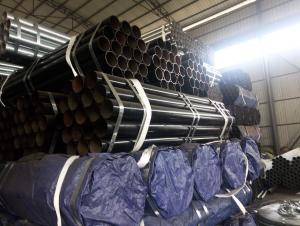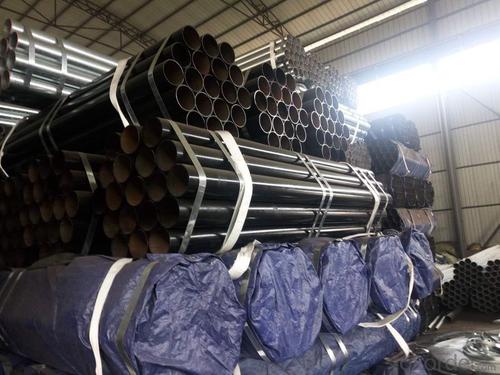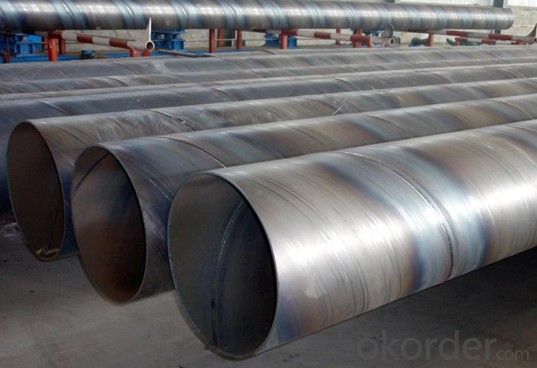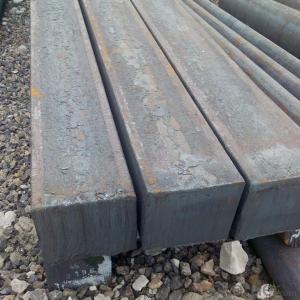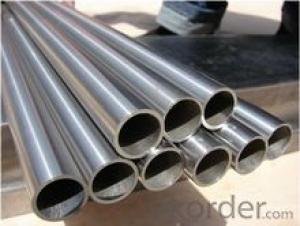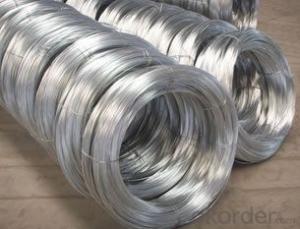SSAW steel pipe from CNBM China to the world around
- Loading Port:
- Tianjin
- Payment Terms:
- TT or LC
- Min Order Qty:
- 25 watt
- Supply Capability:
- 8000 watt/month
OKorder Service Pledge
OKorder Financial Service
You Might Also Like
1、Structure of Welded Steel Tube:
Welded Steel Tube is formed by drawing a solid billet over a piercing rod to create the hollow shell. We are company that have many years experience and professional manager team and engineer team and sales team, sure we will provide you high quality of welded pipe and professioanl service.
2、Main Features of the Welded Steel Tube:
• High manufacturing accuracy
• The higher strength
• The small inertia resistance
• Strong heat dissipation ability
• Good visual effect
• Satisfy price
3、Welded Steel Tube Specification:
Standard | GB, DIN, ASTM ASTM A106-2006, ASTM A53-2007 |
Grade | 10#-45#, 16Mn 10#, 20#, 45#, 16Mn |
Thickness | 8 - 33 mm |
Section Shape | Round |
Outer Diameter | 133 - 219 mm |
Place of Origin | Shandong, China (Mainland) |
Secondary Or Not | Non-secondary |
Application | Hydraulic Pipe |
Technique | Cold Drawn |
Certification | API |
Surface Treatment | factory state or painted black |
Special Pipe | API Pipe |
Alloy Or Not | Non-alloy |
Length | 5-12M |
Outer Diameter | 21.3-610mm |
Grade | 20#, 45#, Q345, API J55, API K55, API L80, API N80, API P110, A53B |
Standard | ASME, ASTM |
1) Material:20#(ASTM A 106/A53 GRB.API5LGRB,GB),45#,16Mn,10#.
2) Specification range:OD:21.3-610mm,WT:6-70mm,length:6-12m or according to the requirement of clients.
3) Excutive standards:GB,ASME API5L.ASTM A 106/A53,Despite of the above standards,we can also supply seamless steel pipe with standard of DIN,JIS,and so on,and also develop new products according to the requirements of our clients!
4) Surface:black lacquered,varnish coating or galvanized.
5) Ends:Beveled or square cut,plastic capped,painted.
6) Packing:bundles wrapped with strong steel strip,seaworthy packing.
4、Packaging & Delivery
Packaging Details: | seaworthy package,bundles wrapped with strong steel strip |
Delivery Detail: | 15-30days after received 30%TT |
5、FAQ of Welded Steel Tube:
①How is the quality of your products?
Our products are strictly in accordance with international and domestic standard. We test on every pipe before delivery. Any quality certification or testing report you want to see, please tell us.
Guaranteed: If products’ quality is not in accordance with description as we provide or the promise before you place order, we promise 100% refund.
②How about the price?
Yes, we are factory and be capable of offering you the lowest price. One of our policy is that “ to save time and be absolutely honest with our business relationship, we quote as low as possible for every client, and discount can be given according to the quantity”, if you are interested in bargain and dissatisfy our factory price, just don’t waste your time. Our quotation is professional.
③Why should you choose us?
Choice happens because of our quality and price. Additionally, we can also offer professional products inquiry, products knowledge train (for agents), fast goods delivery, outstanding customer solution proposals. Our service formula: good quality + good price + good service=customer’s trust.
SGS test is available. Customer inspection before shipping is welcome. Third party inspection is OK.
6、 Welded Steel Tube Images:
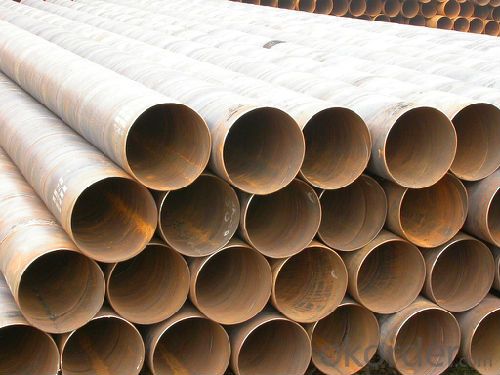
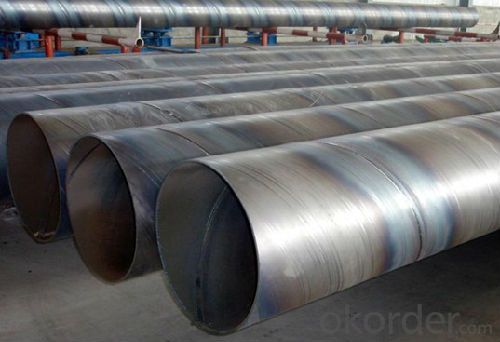
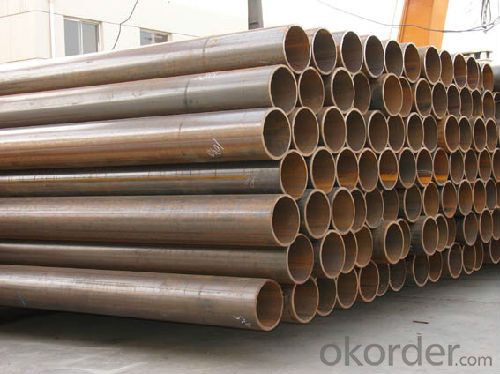
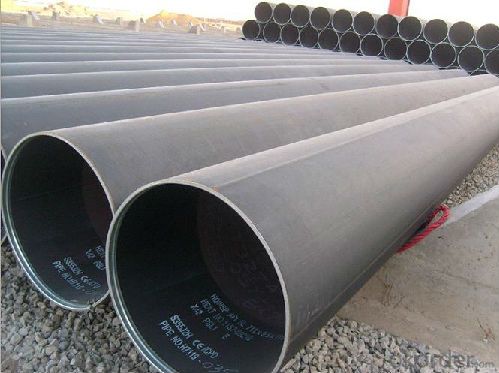
- Q: Can steel pipes be recycled?
- Yes, steel pipes can be recycled. Steel is a highly recyclable material, and the recycling process for steel pipes involves melting them down to create new steel products. Recycling steel pipes not only conserves natural resources but also reduces energy consumption and carbon emissions associated with the production of new steel.
- Q: Can steel pipes be used for automotive applications?
- Indeed, automotive applications do involve the utilization of steel pipes. In the automotive industry, steel pipes find frequent application in exhaust systems, fuel lines, and hydraulic systems, among other purposes. The key attributes of steel pipes, such as their remarkable strength, durability, and resistance to corrosion, render them well-suited for enduring the challenging conditions and requirements of automotive applications. Moreover, steel pipes offer the added advantage of being effortlessly shaped and welded, facilitating customization and simplified installation. All in all, steel pipes offer a dependable and economically viable solution for automotive applications.
- Q: Can steel pipes be used for underground cable protection?
- Yes, steel pipes can be used for underground cable protection. Steel pipes offer durability, strength, and resistance to corrosion, making them suitable for protecting cables from external elements and potential damage. Additionally, steel pipes can provide a secure and reliable conduit for underground cables, ensuring their safety and longevity.
- Q: Can steel pipes be used for gas transportation?
- Yes, steel pipes can be used for gas transportation. Steel pipes are commonly used for the transportation of natural gas, propane, and other gases due to their high strength, durability, and resistance to corrosion. They can effectively withstand high pressure and extreme temperatures, making them a reliable choice for gas transportation systems.
- Q: Can steel pipes be used for natural gas processing plants?
- Yes, steel pipes can be used for natural gas processing plants. Steel pipes are commonly used in the oil and gas industry due to their high strength, durability, and resistance to corrosion. They can safely transport natural gas and are capable of withstanding the high pressure and temperature conditions typically found in processing plants.
- Q: What are the advantages of using steel pipes in plumbing systems?
- There are several advantages of using steel pipes in plumbing systems. Firstly, steel pipes are highly durable and have a long lifespan, making them a reliable choice for plumbing installations. They are resistant to corrosion, rust, and other forms of damage, ensuring the integrity of the plumbing system over time. Additionally, steel pipes have a high tensile strength, allowing them to withstand high pressure and heavy loads without deformation or leakage. They also have excellent heat resistance, making them suitable for hot water and steam applications. Lastly, steel pipes offer a smooth inner surface, minimizing friction and maintaining a consistent flow rate, which is crucial for efficient water distribution and drainage in plumbing systems.
- Q: How are steel pipes used in the construction industry?
- Steel pipes are extensively used in the construction industry for a wide range of applications. They are primarily used for transporting various fluids and gases, such as water, oil, and natural gas, throughout the construction site or building. Steel pipes are also commonly used as structural elements in the construction of buildings, bridges, and tunnels, providing strength and stability to the structures. Additionally, steel pipes are utilized in the construction of plumbing systems, HVAC (heating, ventilation, and air conditioning) systems, and fire protection systems.
- Q: What's wrong with the 3PP anticorrosive steel tube?
- That is, polypropylene corrosion resistant coating of steel pipe, the biggest feature of this anti-corrosion coating is good heat resistance.
- Q: What are the safety precautions to follow when working with steel pipes?
- When working with steel pipes, it is important to follow several safety precautions to ensure the well-being of yourself and those around you. These precautions include: 1. Personal Protective Equipment (PPE): Always wear the appropriate PPE when working with steel pipes. This includes safety glasses, gloves, steel-toed boots, and a hard hat. PPE helps protect you from potential hazards such as flying debris, falling objects, and sharp edges. 2. Proper Lifting Techniques: Steel pipes can be heavy and awkward to handle. Always use proper lifting techniques to avoid strain or injury. Bend your knees, keep your back straight, and use your legs to lift the pipes. If a pipe is too heavy to lift on your own, ask for assistance or use mechanical lifting equipment. 3. Secure Working Area: Ensure that the work area is clean, organized, and free from tripping hazards. Keep the floor clear of tools, debris, and other obstructions that may cause accidents. Additionally, barricade or cordon off the work area to prevent unauthorized access and ensure the safety of others. 4. Use Proper Tools and Equipment: Use the right tools and equipment for the job. This includes using wrenches, pipe cutters, and clamps designed specifically for steel pipes. Using improper tools can lead to accidents, damage to the pipes, or faulty connections. 5. Proper Storage: Store steel pipes in a secure and organized manner to prevent them from falling or rolling onto someone. Stack the pipes in a stable position, and use racks or supports to ensure they are not at risk of toppling over. 6. Secure Connections: When joining steel pipes, ensure that the connections are properly secured. This includes using appropriate fittings, tight fasteners, and following the recommended torque specifications. Loose or improperly secured connections can result in leaks, bursts, or other failures. 7. Proper Ventilation: If working in an enclosed space, ensure adequate ventilation to prevent the buildup of harmful gases or fumes. Welding or cutting steel pipes can release hazardous gases, so make sure the area is properly ventilated or use respiratory protection if necessary. 8. Fire Safety: Steel pipes can become extremely hot during welding or cutting processes. Have fire extinguishers readily available and know how to use them. Clear any flammable materials from the work area and be cautious of sparks or open flames. 9. Regular Inspections: Regularly inspect steel pipes for signs of damage, such as cracks, rust, or degradation. Replace any damaged or compromised pipes to avoid potential failures or accidents. By following these safety precautions, you can minimize the risks associated with working with steel pipes and ensure a safe working environment. Remember, safety should always be the top priority.
- Q: Where is a steel pipe casing usually used?
- The casing, usually used in the basement construction, to protect the pipeline or convenient pipeline installation hoops.
Send your message to us
SSAW steel pipe from CNBM China to the world around
- Loading Port:
- Tianjin
- Payment Terms:
- TT or LC
- Min Order Qty:
- 25 watt
- Supply Capability:
- 8000 watt/month
OKorder Service Pledge
OKorder Financial Service
Similar products
Hot products
Hot Searches
Related keywords
